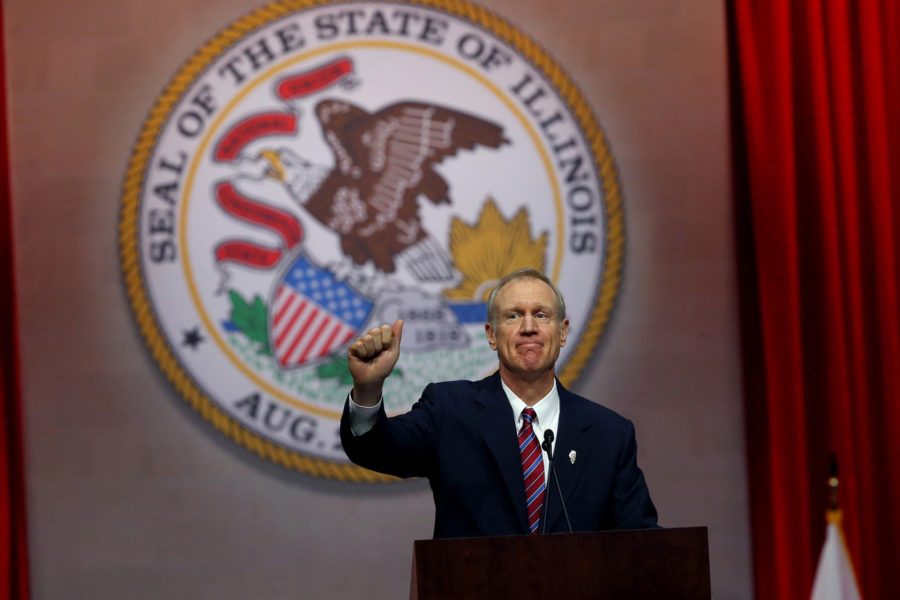UI receives additional stopgap budget, still no permanent state funding
Gov. Bruce Rauner gives a thumbs up after giving his first speech as governor on Monday Jan. 12, 2015 at the Prairie Capital Convention Center in Springfield, Ill. (Nancy Stone/Chicago Tribune/TNS)
Jan 17, 2017
The new year renewed old budget questions for the University. Funding from the state, allocated in a stopgap budget passed in June, expired Jan. 1. The Illinois General Assembly has begun negotiations on a permanent budget, but until anything is passed, higher education remains unfunded.
The University received a $47 million payment from the state last week, University Spokesman Tom Hardy said in an email, completing “virtually all” of the $351 million payments promised in the stopgap budget. However, despite the stopgap budget, the University is still short about half of the $644 million it was promised for fiscal year 2015.
In 2016, the University received 28 percent of the funding the state pledged in 2015, according to Jennifer Creasey, director of state relations for the office of government relations.
“It’s just crazy,” she said. “It just keeps getting worse, snowballing the more it goes.”
The University has urged lawmakers to provide funding for both 2016 and 2017 that match the $644 million pledged in 2015. Creasey hopes the state will award the money, but concedes she doesn’t think it is very likely.
Get The Daily Illini in your inbox!
In the meantime, the University has prepared for the funding to disappear through “belt tightening, operational and administrative efficiencies, reliance on cash available,” and “second semester tuition receipts,” Hardy said. It has also imposed salary freezes, hiring freezes and natural attrition, or reduction, of faculty and non-instructional staff.
He said the University will survive the academic year without having to temporarily or permanently stop anything in order to save money, but that “lurching along like this is not optimal.” The University is confident the state legislature will pass a budget before the spring session ends.
The new session started last week, and Creasey said lawmakers are energized.
“It seems that there is a will on both sides of the aisle,” she said. “I think people have realized that we’ve gone too far, too long and something has to be done.”
Creasey’s team will be there ready to plead its case to lawmakers, but the University has taken steps to create more stable funding.
Ed Feser, interim vice chancellor for academic affairs and provost, who announced his departure for Oregon State next month, initiated a budget reform process. Its goal, he said, is to find ways to establish more independence from the state legislature.
President Timothy Killeen announced the University of Illinois System Investment, Performance and Accountability Commitment, known as IPAC, in November. The U of I Caucus has championed the bill in the state legislature.
If passed, the five-year-bill would establish metrics for the University to meet in order to secure $662.1 million in funding from the state in fiscal year 2018 and at least that amount plus inflation in following years.
Its sponsors filed the bill in November, and they will refile it again now that the new session has started. Creasey has worked with the U of I Caucus members to rally support among their peers, and she’s organizing events for students, faculty and alumni to advocate for the bill.
“We’re trying to rise above the partisan chatter of the current political climate and show that we need a plan in place that would give us predictable, reliable, multi-year funding and in exchange hold us adherent to the state and the people of illinois,” she said.
Whether the strategy can succeed will be seen this spring. The University has until May 31, when Congress adjourns, to present its case.






